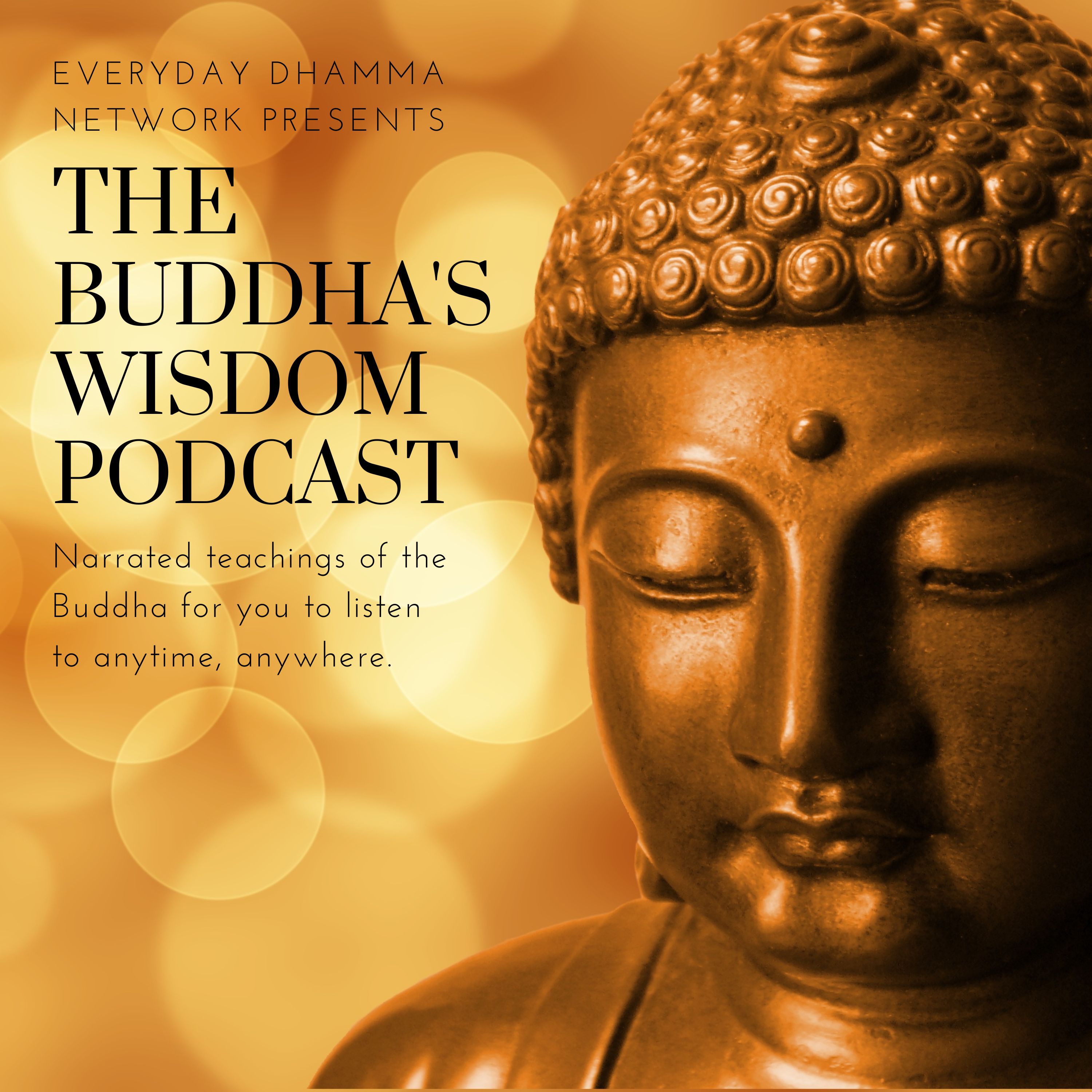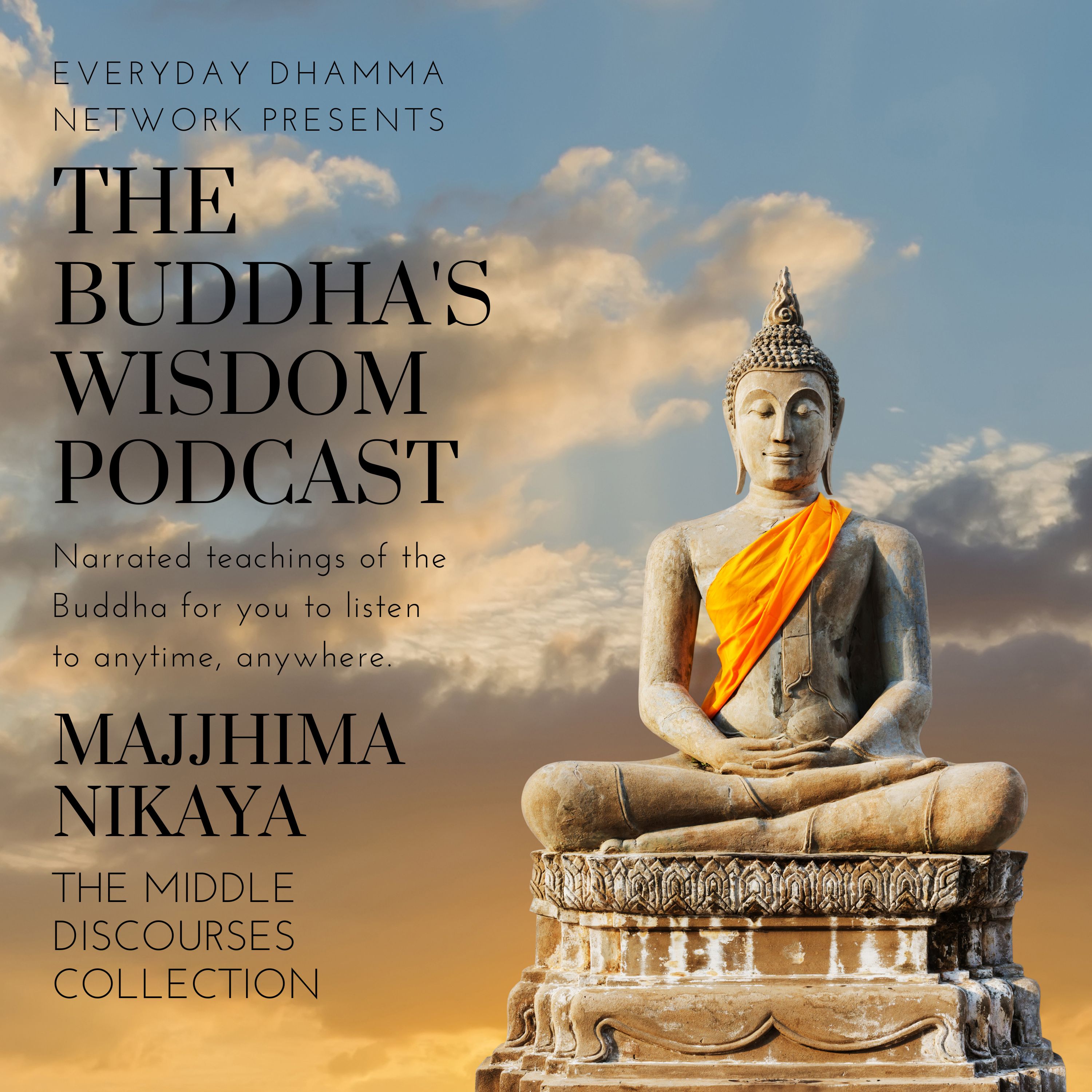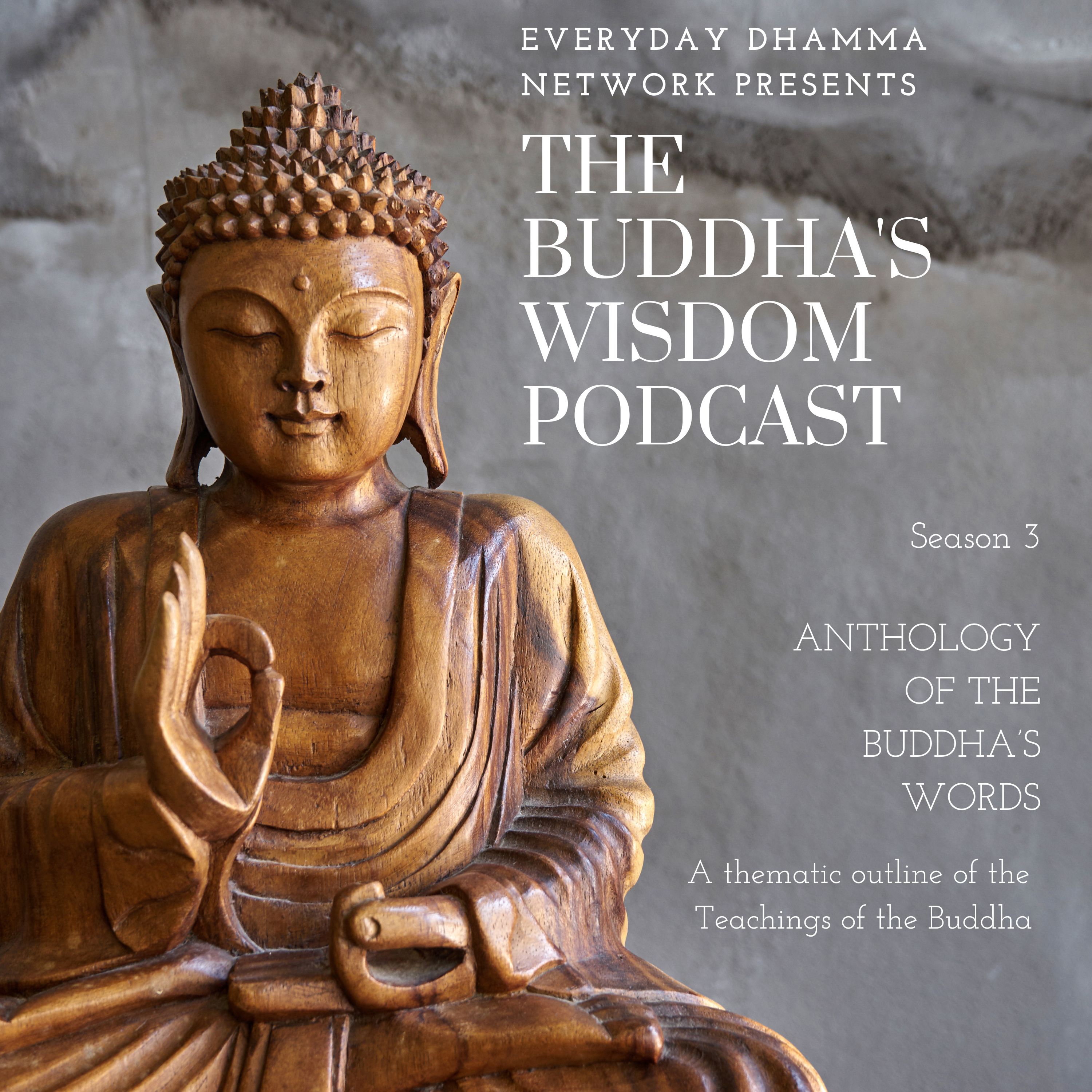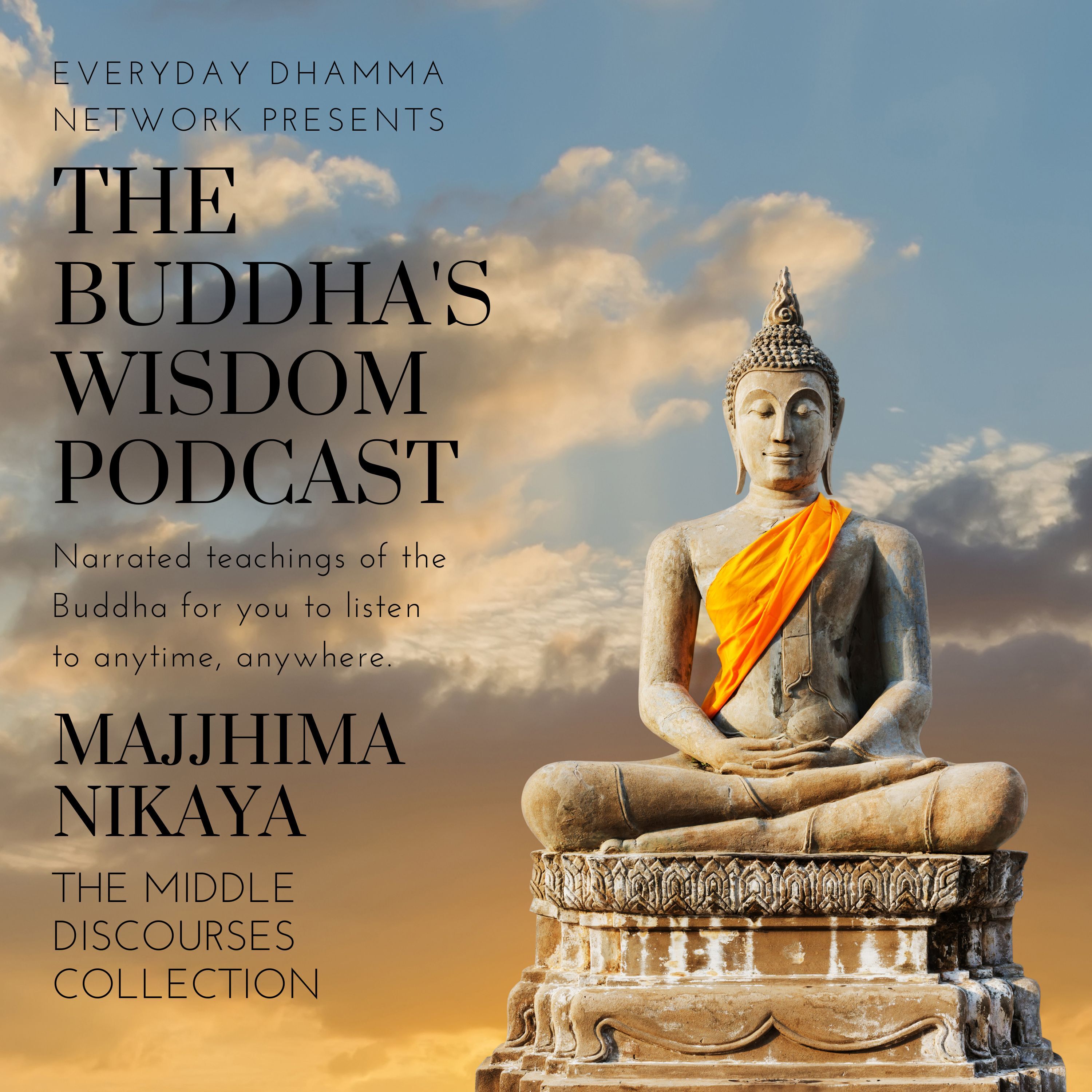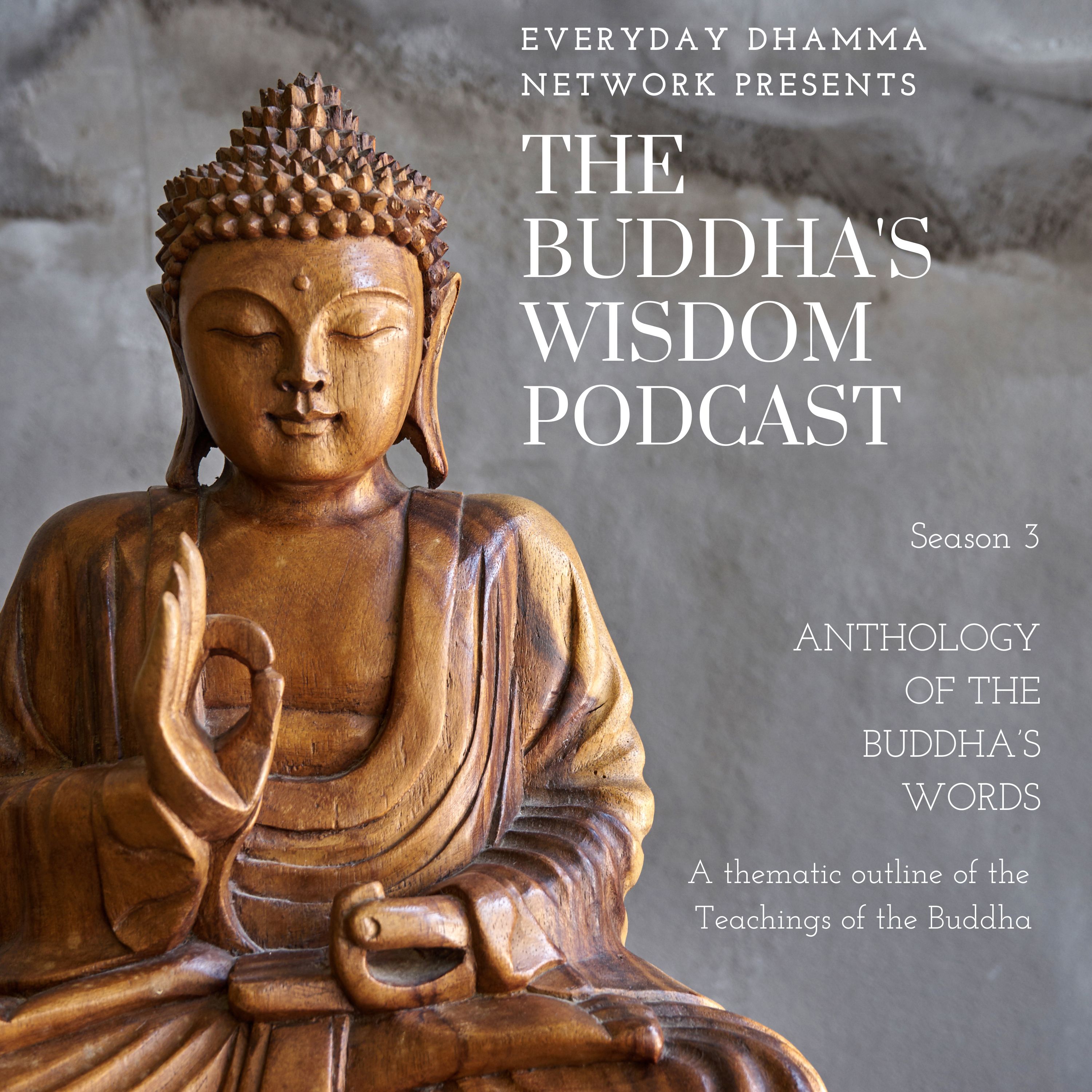Episode Transcript
So I have heard. At one time Venerable Mahāmoggallāna was staying in the land of the Bhaggas at Crocodile Hill, in the deer park at Bhesakaḷā’s Wood. This sutta serves as a showcase for Moggallāna, who is able to swiftly best Māra and recount a detailed story of past lives.
At that time Moggallāna was walking mindfully in the open air.
Now at that time Māra the Wicked had got inside Moggallāna’s belly. Māra is sometimes called Namuci, and in fact seems to descend from the Vedic adversary of that name. Vedic Namuci “the wicked” (pāpmā vai namuciḥ, Śatapatha Brāhmaṇa 12.7.3, Maitrāyaṇī Saṁhitā 4.4.4) was a wily trickster (māyin, Rig Veda 1.53.7c) who was nonetheless outsmarted by Indra (Rig Veda 5.30.6c), and possessed ineffectual armies reliant on women (Rig Veda 5.30.9a). Buddhist Māra “the wicked” (māro pāpimā) was a wily trickster (passim) who was nonetheless outsmarted by the Buddha and his followers (passim); he possessed ineffectual armies (DN 20:21.3, AN 4.13:2.3, Snp 3.2), and sent his daughters to do his dirty work (SN 4.25). The decapitated head of Namuci introduced death (mṛtyu) in the form of blood to the deathless (amṛta) soma (Śatapatha Brāhmaṇa 12.7.3.4, Maitrāyaṇī Saṁhitā 4.4.4), establishing his Pali names Maccurāja, “King of Death” and Māra, “Murderer”. He appears in a similar guise in Jainism too (Ācaraṅga 1.3.1.3). Moggallāna thought, “Why now is my belly so very heavy, like I’ve just eaten a load of beans?” T 66 has 猶若食豆, MA 131 猶如食豆, both of which confirm the sense “full of beans”. T 67 on the other hand has 飢人而負重擔, “like a hungry man bearing a heavy load.” Then he stepped down from the walking path, entered his dwelling, sat down on the seat spread out, and investigated inside himself.
He saw that Māra the Wicked had got inside his belly. So he said to Māra, “Come out, Wicked One, come out! Do not harass the Realized One or his disciple. Don’t create lasting harm and suffering for yourself!”
Then Māra thought, “This ascetic doesn’t really know me or see me when he tells me to come out. Not even the Teacher could recognize me so quickly, so how could a disciple?”
Then Moggallāna said to Māra, “I know you even when you’re like this, Wicked One. Do not think, ‘He doesn’t know me.’ You are Māra the Wicked. And you think, ‘This ascetic doesn’t really know me or see me when he tells me to come out. Not even the Teacher could recognize me so quickly, so how could a disciple?’”
Then Māra thought, “This ascetic really does know me and see me when he tells me to come out.”
Then Māra came up out of Moggallāna’s mouth and stood against the door. Moggallāna saw him there and said, “I see you even there, Wicked One. Do not think, ‘He doesn’t see me.’ That’s you, Wicked One, standing against the door.
Once upon a time, Wicked One, I was a Māra named Dūsī, and I had a sister named Kāḷī. Dūsī the “corrupter” and Kāḷī the “dark lady”, an early mention of a goddess of that name. | This story is also told at Thag 20.1:48.1. You were her son, which made you my nephew.
At that time Kakusandha, the Blessed One, the perfected one, the fully awakened Buddha arose in the world. Kakusandha is mentioned also at SN 12.7:1.1, SN 15.20:2.8, DN 14:1.4.4, DN 32:3.8, and Thag 7.5:4.4. Kakusandha had a fine pair of chief disciples named Vidhura and Sañjīva. Of all the disciples of the Buddha Kakusandha, none were the equal of Venerable Vidhura in teaching Dhamma. And that’s how he came to be known as Vidhura. At AN 3.20:2.1, vidhura is the cleverness of a shopkeeper in trade, illustrating the “indefatigable” mendicant in striving.
But when Venerable Sañjīva had gone to a wilderness, or to the root of a tree, or to an empty hut, he easily attained the cessation of perception and feeling. Once upon a time, Sañjīva was sitting at the root of a certain tree having attained the cessation of perception and feeling. Some cowherds, shepherds, farmers, and passers-by saw him sitting there and said, ‘Oh, how incredible, how amazing! This ascetic passed away while seated. We should cremate him.’ They collected grass, wood, and cow-dung, heaped it all on Sañjīva’s body, set it on fire, and left.
Then, when the night had passed, Sañjīva emerged from that attainment, shook out his robes, and, since it was morning, he robed up and entered the village for alms. Those cowherds, shepherds, farmers, and passers-by saw him wandering for alms and said, ‘Oh, how incredible, how amazing! This ascetic passed away while seated, and now he has come back to life!’ And that’s how he came to be known as Sañjīva. Sañjīva means “survivor”.
Then it occurred to Māra Dūsī, ‘I don’t know the course of rebirth of these ethical mendicants of good character. The idiom āgatiṁ vā gatiṁ vā, literally “comings and goings”, refers to the “course of rebirth”. Why don’t I take possession of these brahmins and householders and say, “Come, all of you, abuse, attack, harass, and trouble the ethical mendicants of good character. Māra urges and encourages, but does not control their behavior, so they are still responsible for their deeds. Hopefully by doing this we can upset their minds so that Māra Dūsī can find a vulnerability.”’ And that’s exactly what he did.
Then those brahmins and householders abused, attacked, harassed, and troubled the ethical mendicants of good character: ‘These shavelings, fake ascetics, primitives, black spawn from the feet of our kinsman, say, “We practice absorption meditation! We practice absorption meditation!” Shoulders drooping, downcast, and dopey, they meditate and concentrate and contemplate and ruminate. The phrase “meditate and concentrate and contemplate and ruminate” (jhāyanti pajjhāyanti nijjhāyanti apajjhāyanti) uses a series of verbs from the same root as jhāna with different prefixes to satirical effect. See also AN 6.46:2.2, AN 11.9:2.10, and MN 108:26.4. They’re just like an owl on a branch, which meditates and concentrates and contemplates and ruminates as it hunts a mouse. They’re just like a jackal on a river-bank, which meditates and concentrates and contemplates and ruminates as it hunts a fish. They’re just like a cat by an alley or a drain or a dustbin, which meditates and concentrates and contemplates and ruminates as it hunts a mouse. They’re just like an unladen donkey by an alley or a drain or a dustbin, which meditates and concentrates and contemplates and ruminates. In the same way, these shavelings, fake ascetics, primitives, black spawn from the feet of our kinsman, say, “We practice absorption meditation! We practice absorption meditation!” Shoulders drooping, downcast, and dopey, they meditate and concentrate and contemplate and ruminate.’
Most of the people who died at that time—when their body broke up, after death—were reborn in a place of loss, a bad place, the underworld, hell.
Then Kakusandha the Blessed One, the perfected one, the fully awakened Buddha, addressed the mendicants: ‘Mendicants, the brahmins and householders have been possessed by Māra Dūsī. He told them to abuse you in the hope of upsetting your minds so that he can find a vulnerability. Come, all of you mendicants, meditate spreading a heart full of love to one direction, and to the second, and to the third, and to the fourth. In the same way above, below, across, everywhere, all around, spread a heart full of love to the whole world—abundant, expansive, limitless, free of enmity and ill will. These meditations counteract the tendency to anger. Meditate spreading a heart full of compassion … Meditate spreading a heart full of rejoicing … Meditate spreading a heart full of equanimity to one direction, and to the second, and to the third, and to the fourth. In the same way above, below, across, everywhere, all around, spread a heart full of equanimity to the whole world—abundant, expansive, limitless, free of enmity and ill will.’
When those mendicants were instructed and advised by the Buddha Kakusandha in this way, they went to a wilderness, or to the root of a tree, or to an empty hut, where they meditated spreading a heart full of love … compassion … rejoicing … equanimity.
Then it occurred to Māra Dūsī, ‘Even when I do this I don’t know the course of rebirth of these ethical mendicants of good character. Why don’t I take possession of these brahmins and householders and say, “Come, all of you, honor, respect, esteem, and venerate the ethical mendicants of good character. Hopefully by doing this we can upset their minds so that Māra Dūsī can find a vulnerability.”’ Māra did not want to genuinely respect the mendicants, but to corrupt them with adulation.
And that’s exactly what he did. Then those brahmins and householders honored, respected, esteemed, and venerated the ethical mendicants of good character.
Most of the people who died at that time—when their body broke up, after death—were reborn in a good place, a heavenly realm.
Then Kakusandha the Blessed One, the perfected one, the fully awakened Buddha, addressed the mendicants: ‘Mendicants, the brahmins and householders have been possessed by Māra Dūsī. He told them to venerate you in the hope of upsetting your minds so that he can find a vulnerability. Come, all you mendicants, meditate observing the ugliness of the body, perceiving the repulsiveness of food, perceiving dissatisfaction with the whole world, and observing the impermanence of all conditions.’ These meditations counteract attachment.
When those mendicants were instructed and advised by the Buddha Kakusandha in this way, they went to a wilderness, or to the root of a tree, or to an empty hut, where they meditated observing the ugliness of the body, perceiving the repulsiveness of food, perceiving dissatisfaction with the whole world, and observing the impermanence of all conditions.
Then the Buddha Kakusandha robed up in the morning and, taking this bowl and robe, entered the village for alms with Venerable Vidhura as his second monk.
Then Māra Dūsī took possession of a certain boy, picked up a rock, and hit Vidhura on the head, cracking it open. Then Vidhura, with blood pouring from his cracked skull, still followed behind the Buddha Kakusandha. Yeva (“still”) has an adversative sense here (see AN 3.82:1.4). Then the Buddha Kakusandha turned to gaze back, the way that elephants do, saying, Nāgāpalokitaṁ, the “elephant look”, was famously employed by the Buddha as he made his final departure from Vesālī (DN 16:4.1.2). There is a similar Sanskrit term siṁhāvalokana, the “lion look”, said to be the slow glance back that a lion makes as he leaves his kill. ‘This Māra Dūsī knows no bounds.’ And as he was gazing, Māra Dūsī fell from that place and was reborn in the Great Hell. The Pali sahāpalokanāya makes it clear that Māra fell to hell while the Buddha was looking, not because he looked. | More details on hell are provided in MN 129 and MN 130.
Now that Great Hell is known by three names: ‘Related to the Six Fields of Contact’ and also ‘The Impaling With Spikes’ and also ‘Individually Painful’. The sense of paccattavedaniya (“Individually Painful”) is clarified in the verses (MN 50:24.6). Then the wardens of hell came to me and said, ‘When spike meets spike in your heart, you will know that you’ve been roasting in hell for a thousand years.’
I roasted for many years, many centuries, many millennia in that Great Hell. For ten thousand years I roasted in the annex of that Great Hell, experiencing the pain called ‘this is emergence’. I think vuṭṭhānimaṁ (“this is emergence”) simply means the feeling that is experienced on “emergence” from the Great Hell to the annex. The commentary, however, says it means the “feeling that emerges as a result of kamma”. My body was in human form, but I had the head of a fish.
What kind of hell was that, where Dūsī was roasted after attacking the disciple Vidhura along with the brahmin Kakusandha?
There were 100 iron spikes, each one individually painful. That’s the kind of hell where Dūsī was roasted after attacking the disciple Vidhura along with the brahmin Kakusandha.
Dark One, if you attack a mendicant who directly knows this, a disciple of the Buddha, you’ll fall into suffering.
There are mansions that last an eon standing in the middle of a lake. Sapphire-colored, brilliant, they sparkle and shine. Dancing there are nymphs shining in all different colors.
Dark One, if you attack a mendicant who directly knows this, a disciple of the Buddha, you’ll fall into suffering.
I’m the one who, urged by the Buddha, shook the stilt longhouse of Migāra’s mother with his big toe as the Saṅgha of mendicants watched. SN 51.14.
Dark One, if you attack a mendicant who directly knows this, a disciple of the Buddha, you’ll fall into suffering.
I’m the one who shook the Palace of Victory with his big toe owing to psychic power, inspiring deities to awe. MN 37:11.4.
Dark One, if you attack a mendicant who directly knows this, a disciple of the Buddha, you’ll fall into suffering.
I’m the one who asked Sakka in the Palace of Victory: ‘Vāsava, I hope you recall In MN 37, Moggallāna calls him Kosiya, but Vāsava is also frequently used as vocative for Sakka. the one who is freed through the ending of craving?’ Moggallāna asked Sakka if he remembered the teaching on this topic that he had received from the Buddha (MN 37:8.1). | The compound taṇhākkhayavimuttiyo is translated as a feminine plural by Norman in Elders’ Verses, but MN 37:2.2 refers to “the mendicant who is freed” in singular. Resolve to taṇhākkhayavimutti yo; vimutti agrees with yo as the nominative singular of the masculine agent noun in -in, which occurs in the same phrase at AN 4.38:6.2 and Iti 55:4.2. And I’m the one to whom Sakka admitted the truth when asked.
Dark One, if you attack a mendicant who directly knows this, a disciple of the Buddha, you’ll fall into suffering.
I’m the one who asked the Divinity in the Hall of Justice before the assembly: ‘Reverend, do you still have the same view that you had in the past? Or do you see the radiance transcending the realm of divinity?’
And I’m the one to whom the Divinity truthfully admitted his progress: ‘Good sir, I don’t have that view that I had in the past.
I see the radiance transcending the realm of divinity. So how could I say today that I am permanent and eternal?’ SN 6.5.
Dark One, if you attack a mendicant who directly knows this, a disciple of the Buddha, you’ll fall into suffering.
I’m the one who touched the peak of Mount Meru using the power of meditative liberation. I’ve visited the forests of the people who dwell in the Eastern Continent.
Dark One, if you attack a mendicant who directly knows this, a disciple of the Buddha, you’ll fall into suffering.
Though a fire doesn’t think, ‘I’ll burn the fool!’ Still the fool who attacks the fire gets burnt.
In the same way, Māra, in attacking the Realized One, you’ll only burn yourself, like a fool touching the flames.
Māra’s done a bad thing in attacking the Realized One. Wicked One, do you imagine that your wickedness won’t bear fruit?
Your deeds heap up wickedness that will last a long time, terminator! Give up on the Buddha, Māra! And hold no hope for the mendicants!”
That is how, in the Bhesekaḷā grove, The commentary to Thag 20.1:69.1 says that this verse was added at the Council. the mendicant condemned Māra. That spirit, downcast, disappeared right there.
